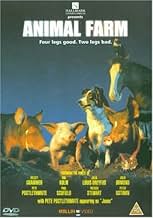ÉVALUATION IMDb
6,0/10
6,7 k
MA NOTE
Ajouter une intrigue dans votre langueThe animals of a farm successfully revolt against its human owner, only to slide into a more brutal tyranny amongst themselves.The animals of a farm successfully revolt against its human owner, only to slide into a more brutal tyranny amongst themselves.The animals of a farm successfully revolt against its human owner, only to slide into a more brutal tyranny amongst themselves.
- Nommé pour 1 prix Primetime Emmy
- 2 victoires et 5 nominations au total
Kelsey Grammer
- Snowball
- (voice)
Julia Louis-Dreyfus
- Mollie
- (voice)
Julia Ormond
- Jessie
- (voice)
Paul Scofield
- Boxer
- (voice)
Patrick Stewart
- Napoleon
- (voice)
Peter Ustinov
- Old Major
- (voice)
Charles Dale
- Moses
- (voice)
- (as Charlie Dale)
- …
Commentaire en vedette
The ending in Animal Farm was not only a travesty to Orwell's original work, but made no logical sense. Certain animals supposedly had the sense and wherewithal to go into hiding on the farm until Napoleon's reign came crashing. Where did they hide? How did they survive? Most of all, why weren't they hunted down as traitors by Napoleon's dogs?
But the real incongruity comes after Napoleon's fall. "The walls have now fallen," (a post-Reaganistic interpretation of the Berlin Wall) and now there is hope in the future. "There are new owners. We will not allow them to make the same mistakes."
What new power and insights do the animals now have to prevent the same mistakes? And just who are these new owners, anyway? Why do the animals (who have proven themselves capable of running a farm, if they are not mismanaged) have to revert to human owners to be their masters again? And why are we to believe these new human owners are better than Jones or Pilkington? Is it because they look more "American," drive a sleeker, newer car, and play rock-n-roll?
Orwell wrote this classic tale as an allegory of modern totalitarianism in general, and Stalinism in particular. TNT's production reeks of a post-modern, imperialistic, corporate-American view of Russia and Eastern Europe today, whose troubles would be over if they would just fully embrace their new owners, American multi-national corporations, with their hip technology and rock-n-roll culture.
But the real incongruity comes after Napoleon's fall. "The walls have now fallen," (a post-Reaganistic interpretation of the Berlin Wall) and now there is hope in the future. "There are new owners. We will not allow them to make the same mistakes."
What new power and insights do the animals now have to prevent the same mistakes? And just who are these new owners, anyway? Why do the animals (who have proven themselves capable of running a farm, if they are not mismanaged) have to revert to human owners to be their masters again? And why are we to believe these new human owners are better than Jones or Pilkington? Is it because they look more "American," drive a sleeker, newer car, and play rock-n-roll?
Orwell wrote this classic tale as an allegory of modern totalitarianism in general, and Stalinism in particular. TNT's production reeks of a post-modern, imperialistic, corporate-American view of Russia and Eastern Europe today, whose troubles would be over if they would just fully embrace their new owners, American multi-national corporations, with their hip technology and rock-n-roll culture.
- neal-34
- 27 juill. 2001
- Lien permanent
Histoire
Le saviez-vous
- AnecdotesIn a revised first draft of the script, co-Writer Martyn Burke had Jessie set to be a six-month-old male Border Collie. This idea was later dropped, and Jessie was made an adult female instead, to give the audiences more sympathy for the main character.
- GaffesWhen the laws painted on the side of the barn are read for the first time, in the close-up shots some of them are already in the altered forms they take later in the movie.
- ConnexionsFeatured in Secrets and Mysteries of Animal Farm (1999)
- Bandes originalesBeasts of the World
Written by Richard Harvey
Performed by Peter Ustinov, Kelsey Grammer, Patrick Stewart, Ian Holm & Cast
Meilleurs choix
Connectez-vous pour évaluer et surveiller les recommandations personnalisées
Détails
- Date de sortie
- Pays d’origine
- Langue
- Aussi connu sous le nom de
- Колгосп тварин
- Lieux de tournage
- sociétés de production
- Consultez plus de crédits d'entreprise sur IMDbPro
Box-office
- Budget
- 23 000 000 $ US (estimation)
- Durée1 heure 31 minutes
- Couleur
- Mixage
- Rapport de forme
- 1.33 : 1
Contribuer à cette page
Suggérer une modification ou ajouter du contenu manquant

Lacune principale
By what name was Animal Farm (1999) officially released in India in English?
Répondre





























